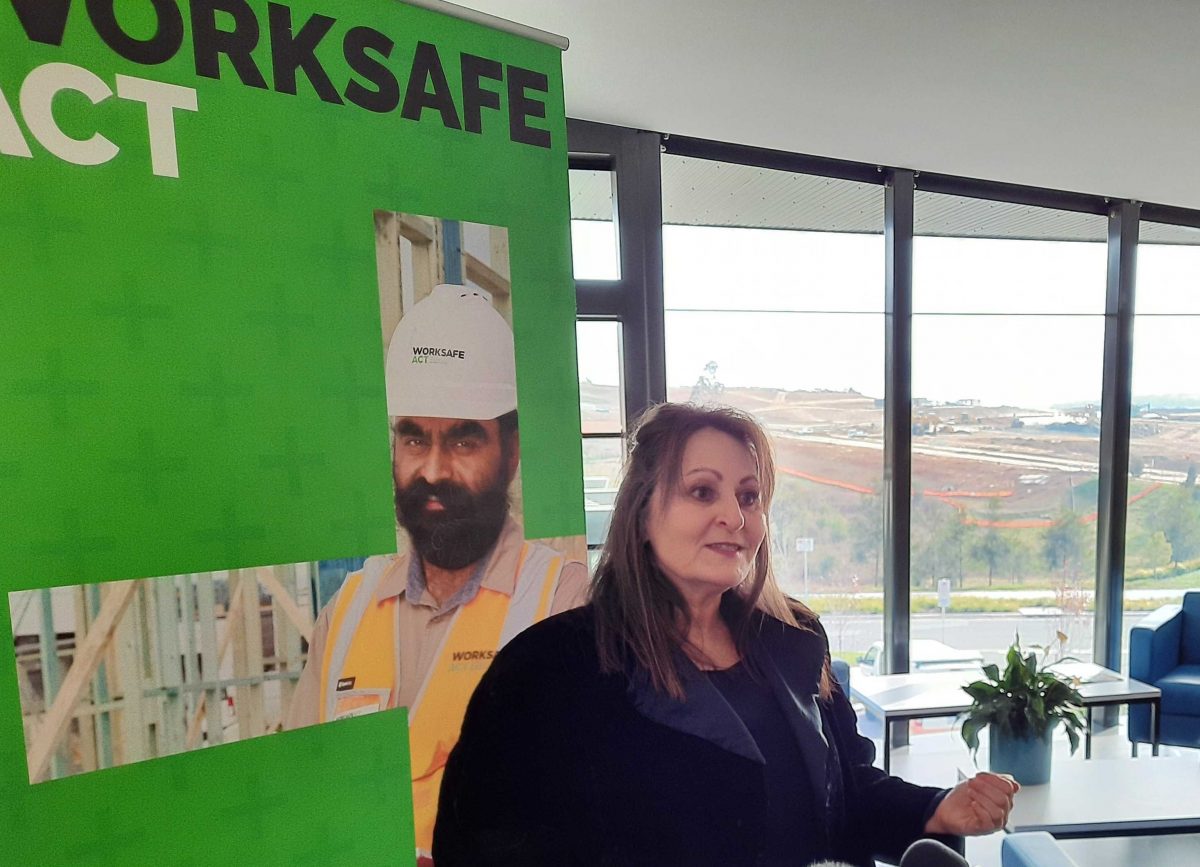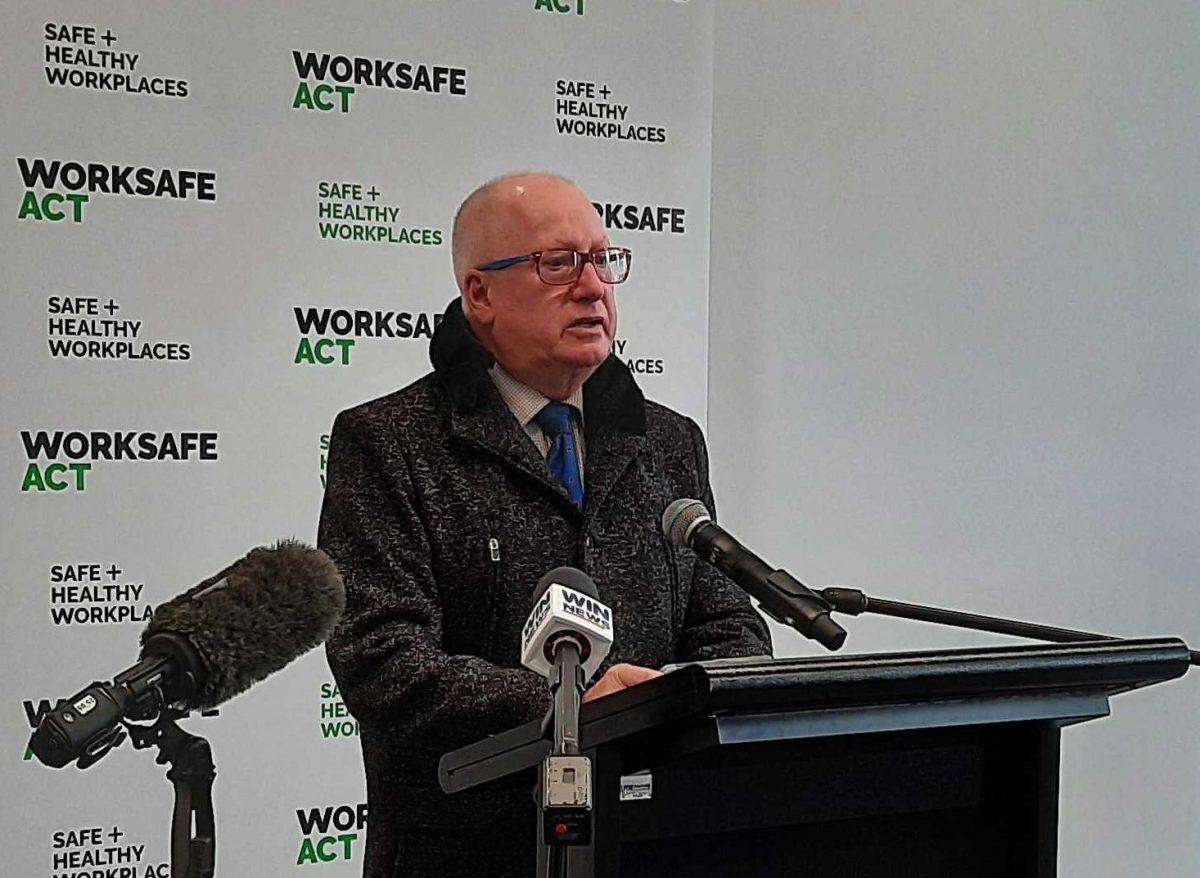
Work Health and Safety Commissioner Jacqueline Agius: “We need more tools and different tools to enforce our legislation.” Photos: Ian Bushnell.
The work safety regulator is pushing for a wider range of penalties and greater scope for prosecutions to stem the unacceptably high number of site breaches and injuries in the ACT’s booming residential construction sector.
Work Health and Safety Commissioner Jacqueline Agius said that despite blitzes and a successful prosecution over the 2020 death of carpenter Thomas Magi on a Denman Prospect site, companies were still not taking enforcement of safety laws seriously.
She told the launch of WorkSafe ACT’s Residential Construction Strategy for 2022-24 that the industry had the highest number of workers’ compensation claims for the past five years compared to other sectors in the Territory.
The most common offences had not significantly changed over the past two years, with breaches for not managing the risks of falls from heights, not securing the workplace and inadequate scaffolding featuring consistently across the ACT.
“Despite all of our collective efforts, we continue to observe unsafe practices and breaches in this industry,” she said. “We are seeing the same offences over and over again.
“I say this to you now, enough is enough. If you fail to comply with the law, it is only a matter of time before your workplace is visited by my inspectors. Non-compliance in all workplaces will be actioned.”
Ms Agius said the updated strategy would build on the work of the last few years to further embed health and safety and safe systems of work into standard industry practices.
Over the past two years, WorkSafe inspectors had made 3000 site visits and enforcement would continue to be stepped up.
Asked if stiffer penalties were needed, Ms Agius said a range of different penalties, including loss of licence, should be available, as well as being able to prosecute repeat offenders before an injury or death occurs.
“When a driver gets into a vehicle and breaches drink-drive laws, which we know can impact and cause a safety risk to our community, there are penalties which include a loss of licence for them,” she said.
“We need more tools and different tools to enforce our legislation.”
Ms Agius said a review was in progress into how prosecutions for work health and safety in the ACT were managed. Recommendations were due around 20 July.
She said she would like to see a broader range of prosecutions available to WorkSafe than those at present under the Act, such as improvement, prohibition and infringement notices.
“Now, if we are not prosecuting offences like the failure to train your workers, failure to consult with your workers, failure to have a safe system of work in place, then we’re not going to see real changes in the construction sector generally or indeed the residential construction sector,” Ms Agius said.
She said repeat offenders should be prosecuted because even if there was not an injury, the risk of one was quite high.
Although there had not been a death since 2020, WorkSafe had seen serious injuries, Ms Agius said.

Planning and Land Management Minister Mick Gentleman supports increasing penalty levels for category one offences.
CFMEU Assistant Secretary Michael Hiscox called for tougher penalties, greater enforcement and for the government to not do businesses with recidivist companies that took a cavalier approach to safety.
Mr Hiscox said the $450,000 fine imposed on Better Building Holdings over the death of Mr Magi was inadequate.
“Is that how little we’re prepared to say a worker’s life is worth?” he asked.
Planning and Land Management Minister Mick Gentleman said Safe Work Australia, the national governing body that sets the model workplace safety laws, was considering increasing penalty levels for category one offences.
“The ACT Government is involved in these conversations and will be advocating for higher penalty levels,” he said.
“Last year, I introduced an industrial manslaughter offence into the Act. This is part of my ongoing commitment to improving safety for all workers.
“I am also working with the WorkSafe Commissioner to better support enforcement and prosecutions.”
Housing Industry Association ACT & Southern NSW executive director Greg Weller said industry recognised more and more that safety was good for business and supported calls for repeat offenders to be brought to account.
Mr Weller said that how a company handled safety also pointed to other aspects of their business.
“If your competitors are not meeting their obligations to provide a safe workplace, then chances are it’s not creating a level playing field for you when you’re quoting for clients,” he said.
A poor safety record would also deter much-needed young people from entering the industry, he said.
But he believed the system was working and that penalties were adequate while always being a part of the conversation.
“I think at the moment, we’ve probably got the balance right in terms of the judicial system,” he said.
“We’re seeing very harsh penalties right now. And no doubt that will be something that continues to be the case going forward.”
As well as ramping up enforcement, WorkSafe will launch a new communications campaign, particularly to reach those in the multi-cultural community with limited English.


















